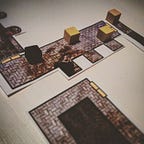Putting the Meaning Behind Fate’s Actions
The topic, as usual with my blog posts, is on Fate Core Tabletop RPG by Evil Hat.
This is one of those blog posts I shouldn’t need to write, but the number of times I come across the argument “Fate feels meaningless to play because every action is mechanically essentially the same, no matter what my character does in the game” keeps staying high, and I keep having to refute that. This results in a more “rant”-like formula than what I usually write, but that’s what you get by wearing me down.
Create an Advantage and Aspects are really the core here, so I’ll focus on that. Overcome can be used to get rid of Aspects, so if you understand CaA, you should be able to see the other side of the coin in Overcome. And Attack and Defend are about ending Conflicts, that are usually defined by Aspects created in them anyways, so they are supplemental to this.
Aspects = Truth
Recap: Create an Advantage is you trying to gain insight into an existing Aspect or to create a new one. If you succeed, you get a Free Invoke on the Aspect (succeed with style, and get two). If you don’t, either nothing happens or someone else gets the Free Invoke. And if you tie, it means you get a Boost, that is mechanically like an Aspect, but doesn’t have the in-fiction weight that a full Aspect would have. (Check out my Actions breakdown for a more in-depth look)
The boring, repetitive argument is that all you can ever do with a Create an Advantage is an Aspect, and get a Free Invoke(s) on that Aspect, and those Free Invokes are always worth the same, no matter what that Aspect is. And the Boost you get on a tie is worth a Free Invoke, so that is mechanically just as good as a full Success. And why on earth would you ever spend Fate Points to make a Boost into a Success on a Create an Advantage Action, as spending a Fate Point is mechanically the same as spending a Free Invoke.
The thing is, besides the mechanics, Aspects also “tell you what’s important about the game, and they help you decide when to use the mechanics” and that, my friend, is a HUGE deal. Creating a new Aspect means that it is important to the game and the situation now.
The “when to use mechanics” is relevant thing too. If you are a ghost and try to scare a hunter who is “not afraid of any ghost” you attempt will not need an Action to see where it is going. Same with the mafioso who is actually “scared of anything supernatural” — why bother with rolling an Action in a situation where the outcome is obvious. Sometimes it might be a Compel, other times just a thing that should happen. Remember this when creating Aspects. They define a lot about when you need mechanics in future situations.
The importance in the game bit means that Aspects create truths and that’s how I’ll talk about them here. That’s the simple of it. You made it, it’s a thing now. The “flipped table” in the middle of the room is providing you protection. Your “nerves are now calm” from smoking a cigarette. The cop is now “scared senseless” of you after you intimidated them. You are now “approaching the battle from the direction of the blinding sun”. Everyone at the table should acknowledge these truths. The GM should play the NPCs according to what has been determined to be important here. And the players should respect what has been said as well. Any Aspect can and should be Compelled, Invoked and used to the maximum effect from the mechanical side, but the main thing is that they should always inform what is happening in the scene and make everyone act accordingly. No-one will see you approaching! (Unless there is an Aspect that would make some “Eagle-eyed scout” able to spot you on that one ship you will have to face, instead of the whole fleet)
And when it comes to creating these, the difficulty to creating that new truth about what the situation is about needs to reflect the Action, naturally — While drawing an enemy’s attention is one thing. Calling them out to fight you in the open should be something else. And making it a formal duel in the middle of the battlefield between you and them that everyone acknowledges should be quite legendary. But a successful creation of an Aspect (that might occur on a Failure too, but someone else will get the Free Invokes) from these different Actions will generate very different truths. The first is easier, but it will have a different impact on what’s happening than the legendary feat. Creating Aspects that are only about you is easy, but rarely affect the big picture. And so on.
And Boosts aren’t Aspects. They are fleeting momentum that doesn’t fully materialise in the fiction. You flip a table and gain a momentary advantage. You make the enemy acknowledge you. You frighten the cop who recovers momentarily. Etc.
Enthusiastic buy-in
So. To take a deep breath and explain how to really combat the non-uniqueness of Actions. When everyone at the table embraces the Aspects as important truths and understands the weight of them to the game beyond the mechanics, you will never ever run into a situation where it doesn’t matter what you are doing in a situation. I challenge you to try this approach in your next game to see it in action.
Also, as a group, you should always discuss what is possible now. If the player wants to affect everyone at a gathering, the GM should make them first Create an Advantage to get everyone’s attention before allowing them to manipulate the whole crowd.
Try it.
